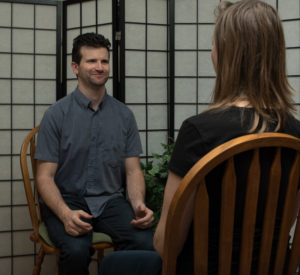By Joe Carr
It has been said that Aspies (people with autism) are “bad at connection”. Because we often don’t understand social cues, facial expressions, or nuanced language, we come off as cold or disconnected. We frequently experience high anxiety in social situations, leading us to avoid them all together and appear to be “loners”. We speak without filters, bluntly saying what we think, and then we’re viewed as uncaring about others’ feelings. And sometimes we’ll talk endlessly about a certain topic without noticing that others aren’t interested, and then we’re judged as boring or obnoxious.
I have found that each one of these behavior traits is actually evidence that we are extremely gifted at connection.
One of the strongest attributes of autism is our heightened sensitivity. This sensitivity does not merely extend to sight, sound, smell and touch, but it’s also energetic. We feel other people’s emotions, energies, and intentions. We’re anxious in social situations because we become overwhelmed with the sensation of feeling everyone. Not only do we receive energy, but we also transmit it. So if we’re in a good mood, everyone around us may feel their spirits lifted. And if we’re in a bad mood, the whole room may feel agitated. This can create a feedback loop, where an Aspie is feeling him or herself as well as others with increasing intensity, leading to a melt down.
Aspies have the powerful innate ability to feel another person deeply, and to have them feel us. Is this not the very definition of connection? The problem is, our society teaches people to relate using words, insinuation, unspoken social cues, and body language. However, these methods of communication aren’t always consistent with a person’s true meaning. In short, people don’t always speak the whole truth. Like when someone says, “I’m fine”, when they are not actually fine. The person may actually believe they are fine, but when a person’s words don’t match what we’re feeling from them, we Aspies can get confused and think we’re crazy. Because we haven’t been taught to trust our feelings, we believe people’s words and then become gullible or naïve. We spend immense energy trying to use our heads to interpret words and facial expressions, when it would be more effective to use our bodies to feel the other person and relate from that place.
When I learned to trust my feelings and use mindfulness practices to be more aware of the energy I am sending and receiving, my social and dating life exploded. I found people that wanted real, honest connection, who appreciated my unfiltered honesty. An Aspie’s willingness to speak the real truth makes vulnerability come more naturally to us than it does to most allistic (non-autistic) people. In relationship, vulnerability is the only pathway to real intimacy, and our ability to honestly say what’s going on for us can create deep connection quickly.
The problem here, is Aspies are used to being judged for what we think and feel. Growing up, we were frequently given the message that we were “too much”, “too intense”, or “over-sensitive” implying something is wrong with our feelings. So despite our natural ability to share our experience, we need to know that we’re not going to be judged or abandoned because of what we feel.
 Our intensity of attention allows us to focus on one task for many hours-sometimes to an obsessive degree. I found that when I focus this attention on another person, they feel it powerfully. It can be overwhelming for someone who isn’t prepared to be seen at that level, but my close friends and intimate partners say my attention feels amazing. Learning to cultivate this attention has led to a rewarding career as a life coach and teacher. Now people hire me to see deeply into them and draw out their own inner truths.
Our intensity of attention allows us to focus on one task for many hours-sometimes to an obsessive degree. I found that when I focus this attention on another person, they feel it powerfully. It can be overwhelming for someone who isn’t prepared to be seen at that level, but my close friends and intimate partners say my attention feels amazing. Learning to cultivate this attention has led to a rewarding career as a life coach and teacher. Now people hire me to see deeply into them and draw out their own inner truths.
My successful relationship and professional skills are not despite my autism, they are because of it. I am not the exception. After coaching and leading workshops for other Aspies, I am clear that autism is a universally powerful tool for deep intimacy and connection. We just have to find the right approach.
So here’s the recipe. Aspies need to cultivate our ability to relate through our feelings at the body level, and let go of these attempts to use our heads to interpreting words and facial expressions. By trusting our intuition and connecting with a person from that place, we will quickly identify who is open to having deeper connection and who isn’t. We need to steer away from those only interested in superficial relating and accept that they are not willing to go as deep as we need to. By showing people our full intense selves, we we will magnetize those that are starving for real vulnerability, intimacy, and connection, which is so rare in a society dominated by consumerism, insecurity and façade.
Plus we need to learn how to calibrate. That is, use our ability to feel another person to intuitively know when we’re sharing too much, gone on a little too long, or when someone needs a different approach. The only thing required for this skill is to trust that you do actually know. and then a lot of practice. When you’re with someone and you get the notion that something doesn’t feel right, take a breath, feel into them, and trust whatever instinct arises. You could ask them what’s happening for them, or offer to change the subject, speed, or nature of the conversation. Or you could just name that you’re feeling something is off and give them space to say what is there. Like anything the more you try it, the better you’ll get.
For non-Aspies, there is so much available in connection with us! You’ll find an honesty, loyalty, and depth of feeling that is beautiful and rare. Here are my suggestions for how to make the most of your relationship with an Aspie. Come without judgment, try to stay open to feeling and being felt, and believe what we say. Be prepared to be a little uncomfortable with the depth of our honesty or emotion. Appreciate our willingness to tell the real truth, even if it doesn’t come out as calibrated or nice as you might be used to. And whatever you do, accept and validate our experience even if you don’t understand or agree with it, and know that we will do the same for you.
I believe that by cultivating autistic intimacy, we can create a society that is more open to the depths of emotion and energetic connectedness, which are a fundamental part of the human experience. Everyone could benefit from being more open, honest, attentive, and sensitive, to absorb the nourishing love available from feeling and letting others feel you.
Deep, intimate connection is one of the many gifts autism brings to the world. So let’s enjoy it.
